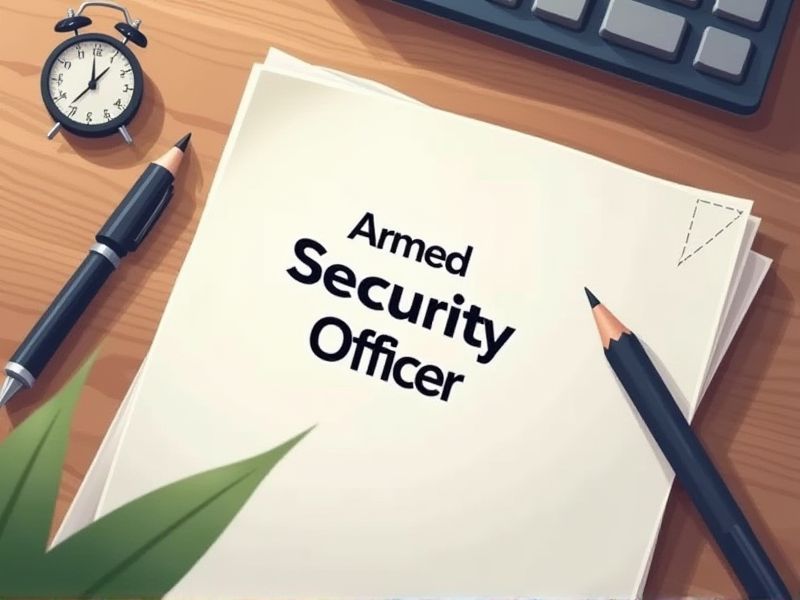
Armed Security Officers play a critical role in ensuring safety and enforcing regulations in high-risk environments. To effectively carry out their duties, these professionals need specific certifications that confirm their ability to handle weapons responsibly and react appropriately under pressure. Certification requirements often cover firearm handling, legal comprehension, and crisis management, aligning their skills with industry standards. Essential certifications for an Armed Security Officer include those focusing on firearm proficiency and situational assessment.
State-Armed Security Guard License
State-Armed Security Guard Licenses ensure that armed security officers meet standardized training and competency requirements, which enhances public safety. They are necessary to regulate the use of firearms by private individuals in security roles, reducing the risk of misuse or accidental discharge. Licenses also provide a vetting process to verify an officer's background and mental fitness, which helps prevent unsuitable candidates from being authorized to carry weapons. The presence of licensed armed security officers can deter criminal activities, as it signals a structured and professional approach to security measures.
Firearms Proficiency Certification
Firearms proficiency certification enhances the safety of both the armed security officer and the public by ensuring proper handling and use of weapons. It reduces the risk of accidental discharge since certified officers are trained in maintaining muzzle discipline and trigger control. Certification verifies that the officer can make sound judgments under pressure, crucial for responding effectively in high-stress situations. Regulatory requirements often mandate certification as a standard to uphold accountability and professional standards in security services.
Use of Force and Defensive Tactics Certification
The Use of Force and Defensive Tactics Certification provides armed security officers with the skills to handle confrontational situations safely and legally. Without proper certification, officers may face legal repercussions due to excessive force or improper handling of incidents. Proper training reduces the risk of injury to both the officer and the public, ensuring a balanced response to potential threats. Security officers demonstrate their professionalism and credibility through certification, instilling confidence in clients and employers.
Active Shooter Response Certification
Active Shooter Response Certification equips armed security officers with specialized techniques for effectively managing high-stress situations. When officers are trained, they can minimize casualties and provide a more coordinated response during an active shooter event. Certification ensures that officers are proficient in both understanding potential threats and utilizing communication strategies. It establishes a standardized level of competence, fostering trust and reliability within the organizations and communities they serve.
Emergency Preparedness and CPR/AED Certification
Emergency preparedness and CPR/AED certification equip armed security officers with lifesaving skills to effectively respond to health crises or accidents on duty. When faced with emergencies such as cardiac arrests, certified officers can provide immediate care that may significantly increase survival rates. Proper training aids in ensuring a swift and educated response, reducing potential liabilities for employers and enhancing the overall safety of the environment. Having certified personnel prepares security teams to handle unpredictable situations, fostering a sense of safety and trust among the people they protect.
Crisis Intervention and Communication Certification
Armed security officers often encounter high-stress situations, where effective communication can de-escalate potential conflicts, making crisis intervention and communication certification vital. Training in crisis intervention equips officers with skills to recognize signs of distress and respond appropriately, reducing the likelihood of violence. Certification ensures that officers possess a standardized set of skills, fostering consistency and reliability in handling emergencies. Proper communication techniques also enhance the public's trust in security personnel, potentially preventing crises from escalating in the first place.
Legal and Ethical Standards in Security Certification
Legal and ethical standards in security certification for armed security officers ensure public safety by setting clear guidelines for appropriate use of force. They help maintain accountability and transparency in the industry, reducing incidents of misuse or abuse of power. Strict standards also enhance the credibility and professionalism of security personnel, reassuring the public and clients of their competence. Adhering to these standards minimizes legal liabilities for both the officers and their employers, leading to a more trustworthy security environment.
Surveillance and Technology Integration Certification
With increasing technological advancements in security systems, armed security officers require proficiency in surveillance and technology integration to operate efficiently. Enhanced surveillance capabilities directly improve the ability to anticipate and respond to potential threats. Knowledge in technology integration ensures that officers can effectively utilize modern tools, like drones and smart cameras, for comprehensive security coverage. Certifications formalize this expertise, ensuring a standardized level of competence and trustworthiness in critical security roles.
Threat Assessment and Risk Management Certification
Threat Assessment and Risk Management Certification equips armed security officers with the skills to identify potential dangers and respond effectively, reducing the likelihood of incidents. This certification ensures that officers are prepared to make informed decisions in high-pressure environments, enhancing overall security measures. By understanding and managing risks better, certified officers contribute to creating safer environments for personnel and property. The certification also provides a structured framework that aligns with industry standards, increasing the credibility and competence of security personnel.
Leadership and Management in Security Operations Certification
Certification in Leadership and Management in Security Operations equips armed security officers with advanced skills to handle complex security challenges. Possessing such a certification reflects a deeper understanding of strategic planning and resource management, essential for maintaining safety and order. This credential enhances their ability to lead teams effectively, especially in high-pressure situations. Demonstrating these competencies can also increase job opportunities and career advancement within the security industry.
Summary
When you obtain certifications as an Armed Security Officer, your professional credibility significantly increases. Employers are likely to view you as more competent and trustworthy, potentially leading to better job opportunities. Enhanced skills and knowledge from certifications can also improve your job performance and effectiveness in security roles. Clients and colleagues often perceive certified officers as more reliable, which can boost your reputation in the industry.
